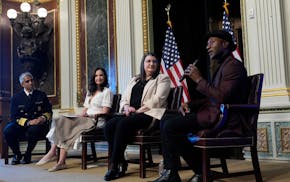"She was the light that lit up my life."
"Her hugs were warmer than the sun."
Those are the words of fifth-grade students after their teacher died, written in a memory book for the family. The substitute teacher took individual pictures of the kids to accompany their writings. The messages varied from touching to lighthearted.
Grieving kids need special handling and the elementary school in Faribault, Minn., had done its homework. For many of the students, losing their teacher to cancer was a first experience with the death of someone close. All of the families from the classroom were phoned personally by the principal or, in some cases, by the school social worker after notice of the death.
By the next afternoon, the children were invited to gather together with the staff, where together they made cards and decorated a banner to be displayed at the funeral.
The substitute teacher was a familiar face. The principal and social worker were present when the students were given the details surrounding their teacher's death; they had known she was fighting cancer. A few students told of other losses in their lives. Although the tone was solemn, the kids opened up as the day went on, and began asking questions, including many about cancer. Students were assured that it was OK to laugh and have fun, and that their teacher would want them to enjoy their good memories.
Each day after, life at school felt a little more normal.
Comfort at home
Parents and other family members can deal with their children's grief in much the same way as schools do.
"As parents, we need to make ourselves 'askable' by bringing emotional issues up with our kids and following up on them," said Thomas Greenspon, a Minneapolis family therapist. "We don't have to have perfect answers; there aren't any. The point of conversation is to reassure kids that they don't have to deal with emotional crises alone."
Grief counselors point out that it is important to be honest with youngsters right from the start. The information presented to them should be accurate and factual, and correct words should be used, such as "dead" and "died," not "passed on" or "a long sleep," which can confuse them.
Experts suggest that belongings or photos of the deceased person be left unchanged because visual reminders help with grieving. Parents may want to involve children in decisions on what should be done with personal mementos.
Most children need a sense of routine, especially during a difficult time such as a death. Stability is comforting; structure feels safe.
Check in, again
While adults may think kids are resilient and back to normal, Greenspon advises following up. "You can say, 'I don't want to be a pest, but I was just wondering if you had any other thoughts or feelings about this topic.' If everything seems to be OK, you can let it go, but parents can make it a point to watch for changes in their kids' emotional states, and ask if these have to do with the event. I think it's better to err on the side of too much concern."
Today's children who are growing up with ample violence in the news may find that fear, which can be a normal part of grief and loss, is intensified. They have learned that there is no perfect protection for anyone, even schoolchildren. Parents can help youngsters feel empowered by talking about better school security, improved mental health resources and other safety measures.
"It helps kids to know that there are a lot of people working hard on all of these fronts, and that there may be ways for some kids to join in," said Greenspon.
G.J. Olson is a retired teacher in Faribault, Minn.
RESOURCE
"What on Earth Do You Do When Someone Dies?" by Trevor Romain

Photographer alleges he was forced to watch Megan Thee Stallion have sex and was unfairly fired
Phish fans are famously dedicated. What happens when they enter the Sphere?
Minneapolis will bid to host Sundance Film Festival

Icehouse on Eat Street in Mpls. facing eviction for unpaid rent
